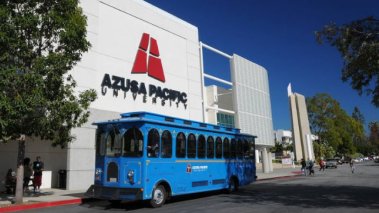Table of Contents
Disinvitation Season Continues at Azusa Pacific University and Elsewhere

Azusa Pacific University (APU) in California has “postponed” a scheduled talk by Charles Murray, fellow at the American Enterprise Institute and co-author of (among other works) The Bell Curve, citing “the lateness of the semester” as well as “the full record of Dr. Murray’s scholarship.” The university claims that it will host Murray on campus for a “thoughtful and meaningful dialogue” in the 2014–2015 academic year.
If this sounds familiar, it’s because it is familiar: Earlier this month, Brandeis University reversed its decision to award an honorary degree to women’s rights activist Ayaan Hirsi Ali, similarly citing “certain of her past statements that are inconsistent with Brandeis University’s core values.” Brandeis’ statement on the matter also concluded by claiming that Hirsi Ali would be “welcome to join us on campus in the future to engage in a dialogue about these important issues.”
So, this appears to be the script:
1. University invites controversial figure to campus.
2. Controversial figure generates controversy.
3. University disinvites controversial figure, citing previous ignorance of his/her controversial views.
4. University claims controversial figure is welcome on campus at unspecified future date.
The worst part of this, to me, is these universities’ total cowardice in dealing with any sort of pushback on controversial speakers. Do they really think we will believe that they were previously unaware of Ayaan Hirsi Ali’s views on Islam or Charles Murray’s writings on race and intelligence? Do they take us for fools?
And as John Leo points out over at Minding the Campus, APU’s claim that the cancellation was due in part to the “lateness of the semester” also strains credibility:
Your point that the April 23rd speech would have been late in the school year is absolutely accurate. But most people tend to believe you knew all along that late April is closely followed by early May, when Azusans are traditionally released from the occasional but dreaded school pressure of having to read and listen to people they don’t already agree with. As Dr. Murray pointed out, the speech had been planned for months, with the April-May proximity fully understood by seasoned calendar readers, one of whom should surely be on your staff.
In response to the debacle, Charles Murray posted “An open letter to the students of Azusa Pacific University” on the American Enterprise Institute’s website. In it, he urged students:
Explore for yourself the “full range” of my scholarship and find out what it is that I’ve written or said that would hurt your faculty or students of color. It’s not hard. In fact, you can do it without moving from your chair if you’re in front of your computer.
You don’t have to buy my books. Instead, go to my web page at AEI. There you will find the full texts of dozens of articles I’ve written for the last quarter-century. Browse through them. Will you find anything that is controversial? That people disagree with? Yes, because (hang on to your hats) scholarship usually means writing about things on which people disagree.
[…]
Azusa Pacific’s administration wants to protect you from earnest and nerdy old guys who have opinions that some of your faculty do not share. Ask if this is why you’re getting a college education.
Sadly, APU and Brandeis are not the only institutions to have chosen censorship over free speech and debate in this “disinvitation season.” Just last week, The Chronicle of Higher Education reported that Pasadena City College (PCC) in California had decided not to invite Oscar winner and LGBT activist Dustin Lance Black to speak at commencement because of explicit photographs of Black that surfaced on the Internet. Following a similar script to the one I mentioned, the college later claimed that procedural errors were actually to blame for the decision, despite the fact that the college’s board chair had already been quoted as saying that “We just don’t want to give PCC a bad name.”
And elsewhere, students and faculty—who have quickly caught on to the fact that universities can be successfully pressured into disinviting controversial speakers—are calling for more disinvitations. Students at Suffolk University in Boston have launched a petition calling for the university to reconsider its choice of Abraham Foxman, head of the Anti-Defamation League, as its law school commencement speaker. And faculty and students at Rutgers University-New Brunswick have been vocal in their attempts to pressure Rutgers into disinviting former Secretary of State Condoleezza Rice as the university’s commencement speaker.
So far, both of these universities are standing behind their choices, and we hope they continue to do so. Universities should defend the importance of open dialogue and debate even when faced with those—indeed, particularly when faced with those—who say, to quote Mark Steyn, “Why bother winning the debate when it’s easier to close it down?”
We also hope that other universities will choose to follow the lead of institutions like Rutgers and Suffolk (so far) rather than APU, Brandeis, or PCC. The more that universities give in to calls for censorship, the more emboldened the would-be censors become, giving birth to a vicious cycle that totally eviscerates the notion of a university as a marketplace of ideas.
Image via Google+
Recent Articles
FIRE’s award-winning Newsdesk covers the free speech news you need to stay informed.

Texas tramples First Amendment rights with police crackdown of pro-Palestinian protests

Here’s what students need to know about protesting on campus right now

Kansas takes a stand for intellectual freedom
